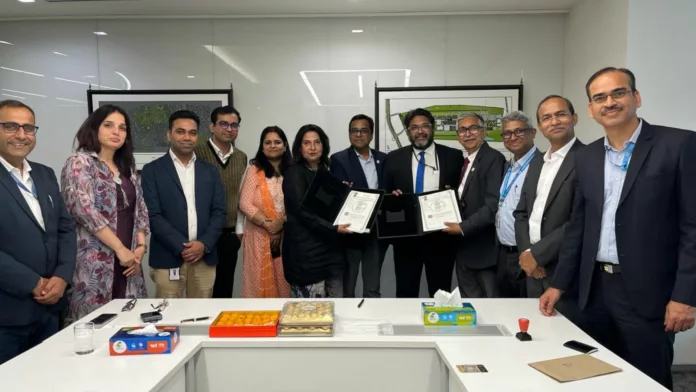Bengaluru: Noida International Airport (NIA) and Bharat Petroleum Corporation Limited (BPCL) signed an Agreement on 20th February 2024 to lay a dedicated aviation turbine fuel (ATF) pipeline from BPCL’s Piyala Terminal to the tank farm at Noida International Airport, efficiently meeting the airport’s ATF demand while reducing carbon emissions.
The Agreement was signed by Shri Sujit Kumar, Chief General Manager, Marketing (Aviation) from BPCL and Ms. Nitu Samra, Chief Financial Officer, NIA in the presence of Shri Biju Gopinath, Executive Director (Pipelines) and Shri Sanjeev Kumar, Business Head (Aviation), BPCL, Ms. Kiran Jain, Chief Operating Officer and Ms. Mayuri Vats Head of Legal, NIA.
The dedicated ATF pipeline spans over 34 kilometres, extending 1.2 kilometres within the airport premises. Once operational, this pipeline will operate on a common/contract carrier basis, ensuring seamless fuel transportation to the airport.
Aligned with Noida International Airport’s commitment to environmental stewardship, this common-use fuel transportation pipeline will ease fuel receipt operations and mitigate emissions by eliminating the need for tank lorry movements.
In a statement, Shri Sukhmal Jain, Director (Marketing), BPCL, said that BPCL has been the pioneers in setting up ATF facilities at the airports and allied infrastructure in India since the time aviation industry took off in the country. He emphasized BPCL’s commitment to reducing carbon emissions by minimising the road transportation of fuel and fostering a more sustainable future.
Echoing this sentiment, Ms. Kiran Jain, Chief Operating Officer, Noida International Airport, said, “We are pleased to collaborate with BPCL for the development of a common-use fuel transportation pipeline, which aligns with our strategic vision of offering cost-efficient and sustainable solutions that are more economical for the transportation of liquid fuels compared to road transport. We are confident that this move will reduce carbon emissions and boost our overall efficiency, contributing to a more sustainable future, which is the need of the hour.”

